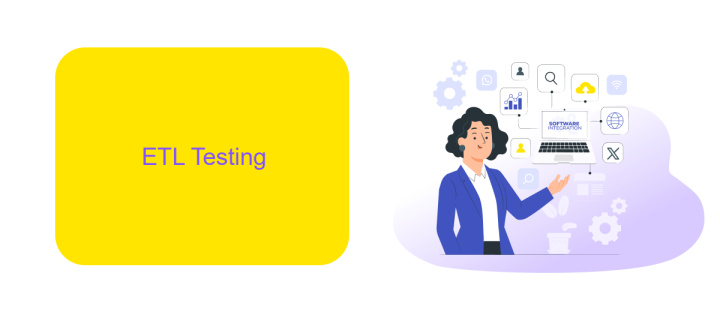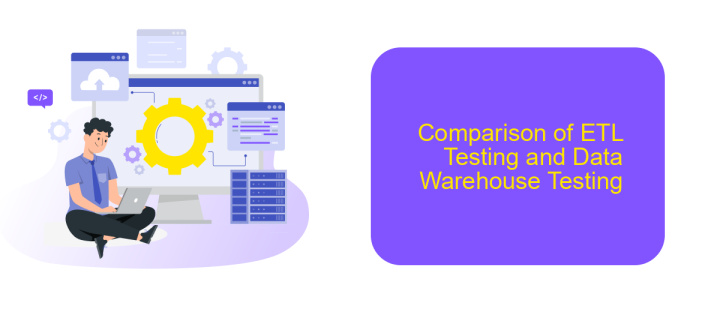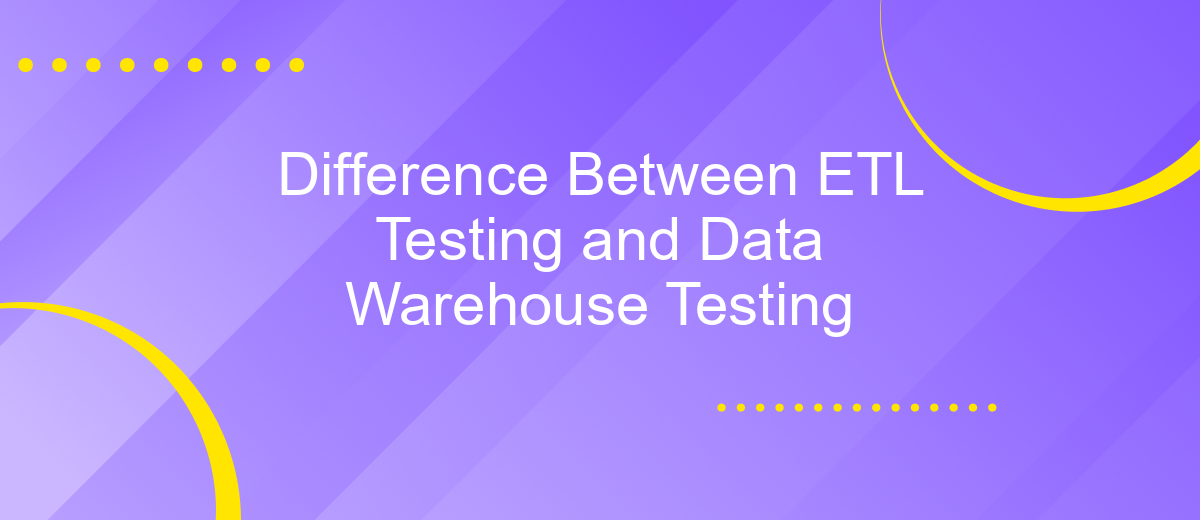Difference Between ETL Testing and Data Warehouse Testing
Understanding the distinctions between ETL (Extract, Transform, Load) testing and Data Warehouse testing is crucial for ensuring data integrity and accuracy in business intelligence processes. While both are integral to managing and analyzing large data sets, they serve different purposes and involve unique methodologies. This article explores these differences, providing insights into their specific roles and importance in data management.
Introduction
In the realm of data management, the terms ETL testing and Data Warehouse testing often surface, yet they are frequently misunderstood or used interchangeably. Understanding the differences between these two testing methodologies is crucial for ensuring data integrity, accuracy, and reliability in any data-driven organization.
- ETL Testing: Focuses on the process of extracting, transforming, and loading data from source systems to target systems.
- Data Warehouse Testing: Involves validating the data stored in the data warehouse and ensuring it meets business requirements.
- Scope: ETL testing is more concerned with the data flow and transformation rules, while Data Warehouse testing emphasizes the end-state of the data.
Both ETL and Data Warehouse testing play pivotal roles in the data lifecycle. Leveraging advanced integration services like ApiX-Drive can streamline these processes by automating data flows and ensuring seamless connectivity between disparate systems. This not only enhances efficiency but also reduces the risk of data inconsistencies and errors, thereby supporting robust data management practices.
ETL Testing

ETL Testing focuses on validating the process of Extract, Transform, and Load operations that are crucial for moving data from source systems to target data warehouses. The primary objective is to ensure that the data extracted from various sources is accurately transformed according to business rules and loaded into the target system without data loss or corruption. This involves checking data completeness, accuracy, and integrity at each stage of the ETL process, including pre-ETL, during ETL, and post-ETL phases.
In ETL Testing, automated tools like ApiX-Drive can be employed to streamline the integration and validation processes. ApiX-Drive allows for seamless data integration between multiple platforms, ensuring that data is consistently and correctly transferred. Using such tools can significantly reduce the complexity and manual effort involved in ETL Testing, making it easier to identify and resolve issues promptly. This ensures that the data pipeline is reliable and that the business can trust the insights derived from the data warehouse.
Data Warehouse Testing

Data Warehouse Testing is a critical process to ensure the accuracy, reliability, and performance of data stored in a data warehouse. This type of testing involves validating the data integration, transformation, and loading processes to confirm that data is correctly transferred from source systems to the data warehouse.
- Data Validation: Verify that data in the data warehouse matches the source data and meets all business requirements.
- Performance Testing: Assess the data warehouse’s performance under various loads to ensure it can handle the expected volume of data queries and transactions.
- ETL Process Testing: Validate the Extract, Transform, Load (ETL) processes to ensure data is accurately and efficiently processed.
- Integration Testing: Ensure that the data warehouse integrates seamlessly with other systems and tools, such as ApiX-Drive, which can automate and streamline data integration tasks.
- Security Testing: Confirm that data is protected against unauthorized access and breaches.
By conducting thorough data warehouse testing, organizations can guarantee the integrity and performance of their data warehouses. This ensures that business intelligence and analytics efforts are based on accurate and reliable data, ultimately supporting better decision-making and strategic planning.
Comparison of ETL Testing and Data Warehouse Testing

ETL Testing and Data Warehouse Testing are both crucial components in ensuring the accuracy and reliability of data management systems. However, they serve distinct purposes and involve different processes. ETL Testing focuses on the extraction, transformation, and loading of data from source systems to target systems. This type of testing ensures that data is accurately extracted from various sources, transformed according to business rules, and loaded into the destination system without any loss or corruption.
On the other hand, Data Warehouse Testing is concerned with the verification and validation of the data warehouse itself. It ensures that the data stored in the warehouse is accurate, consistent, and reliable for business intelligence and reporting purposes. This type of testing involves checking data integrity, performance, and security within the data warehouse environment.
- ETL Testing validates data movement between systems.
- Data Warehouse Testing ensures data accuracy within the warehouse.
- ETL Testing focuses on transformation rules and data quality.
- Data Warehouse Testing checks for data consistency and integrity.
While both testing types are essential, they address different aspects of the data lifecycle. Tools like ApiX-Drive can facilitate the integration and automation of these processes, ensuring seamless data flow and reliable data management.
- Automate the work of an online store or landing
- Empower through integration
- Don't spend money on programmers and integrators
- Save time by automating routine tasks
Conclusion
In summary, ETL testing and Data Warehouse testing, while closely related, serve distinct purposes in the data management lifecycle. ETL testing focuses on verifying the data extraction, transformation, and loading processes to ensure data accuracy and integrity. On the other hand, Data Warehouse testing encompasses a broader scope, including the validation of data storage, retrieval, and overall performance of the data warehouse system.
Both types of testing are crucial for maintaining high-quality data systems, but they require different approaches and tools. As businesses increasingly rely on data-driven decisions, the importance of rigorous testing cannot be overstated. Tools like ApiX-Drive can facilitate seamless integration and automation of these testing processes, ensuring that both ETL and Data Warehouse systems function optimally. By leveraging such services, organizations can streamline their data workflows, reduce errors, and enhance overall data reliability.
FAQ
What is the primary difference between ETL Testing and Data Warehouse Testing?
Why is ETL Testing important?
What are the common challenges faced in Data Warehouse Testing?
How can automation tools help in ETL Testing and Data Warehouse Testing?
What are the key components to test in a Data Warehouse?
Time is the most valuable resource for business today. Almost half of it is wasted on routine tasks. Your employees are constantly forced to perform monotonous tasks that are difficult to classify as important and specialized. You can leave everything as it is by hiring additional employees, or you can automate most of the business processes using the ApiX-Drive online connector to get rid of unnecessary time and money expenses once and for all. The choice is yours!


